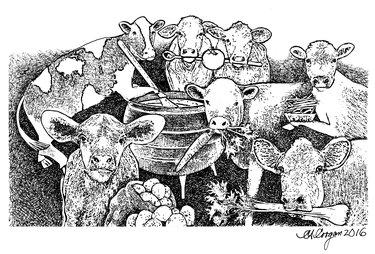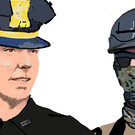If each contributes what can be spared, the whole is nourished
After years of writing about ugly neighbor disputes and years of writing about failing farms and years of writing about kids with disabilities having trouble finding a worthwhile place in the world, we’re providing an antidote here and now.
Drink it in like an elixir.
Is it too good to be true? Only time, and the community’s response, will tell.
The tale starts in the fall of 2015 when the two cows of a green farmer break into the pasture of a longtime farmer. Did angry words, and spats, and legal action follow?
Not at all. Here’s the story.
Dennis Peterson is rather new to farming. He, his wife, and their three children have 90 acres on Slade Hill in Westerlo. Originally from Long Island, Peterson is 52 now and retired from a federal job. His family has lived in Westerlo for 12 years where they are raising pigs and goats, chickens and turkeys.
Peterson decided to add two cows to his menagerie. When his cows escaped and ended up at his neighbors’, he said, “They tore up his fence and made a big mess.”
His neighbor, Bud Figel, agreed. “His Dexters broke the fence and were in with my whiteface,” he recalled.
But the incident didn’t lead to animosity between the neighbors; rather, they became friends — and more.
For a half-century, Figel has farmed 166 acres that he leases from the city of Albany; two streams that feed Albany’s Westerlo reservoir run through the property, he said.
Figel was born and raised in Albany. His father built a house in Westerlo in the 1940s that the family used weekends and summers because the phone service wasn’t adequate for his father’s plumbing and heating business. At 12, Bud Figel started working with his father in the business. At 72, he still works a few hours on plumbing jobs almost every day.
“I have heart problems and can’t really farm anymore,” he said. He used to sell breeding stock but now he is down to 12 cows.
One day, he was throwing bales of hay in his barn when he suffered a heart attack. “I went down. I couldn’t get my breath.” He lay on the hay bales awhile where his wife found him — and then got up to throw more bales.
He ended up in St. Peter’s Hospital, having open-heart surgery.
“I went to round bales,” he said but, now, even that is getting hard.
Neither of his children wanted to take on farming, he said. So he is teaching Peterson’s oldest child, Dennis Jr., about the art and science of farming. “He comes over to the farm a lot. He likes cows,” said Figel.
Figel went on about Peterson, “I told him to take the cows. I can’t take care of them no more.”
All three of the Peterson children are autistic, their father said. Dennis, 21, has just graduated from a special program at The College of Saint Rose. Ryan, 19, has just graduated from Berne-Knox-Westerlo and will attend the same Saint Rose program. Chrissy is 14 and still in school.
“We want to get the farm running for our kids so they can stay here, in this house, instead of going into a group home,” said Peterson. He said of himself and his wife, “We won’t be here forever.”
Now Dennis Jr. is helping Figel with the haying, just the way Figel, in his youth, used to help other Westerlo farmers. “He’s very interested. He wants to learn everything,” said Figel.
Dennis Jr. has a passion for farming, his father said. He secured a loan from the federal Farm Service Agency for $11,000 less than half of what he requested but enough to make a start. With the loan, the Petersons got a tractor with a bucket and a haybine to cut hay. Peterson chipped in money he had from selling pigs to buy a round baler as well.
A man from Wright gave Peterson a good deal on the haybine when he understood the need. “He wanted $2,300. I gave him $800. He said, ‘It’s important you get the round baler. I can wait for the money. Pay me when you can.’”
Another farmer in South Westerlo had two hay rakes — one that works and one for parts. He donated them both to the cause.
This part of the story reminded us of one of our favorite childhood tales, about stone soup. The story tells of two weary travelers who, as darkness falls, reach a poor village. One of the travelers carries a soup pot.
The pair goes from house to house, asking for any ingredients the villagers may have to spare, to make a soup. Door after door is closed on them. The villagers are poor, and each says he or she has nothing to spare and nothing to share.
The travelers fill their pot with water from a nearby stream and build a fire with scavenged wood to heat it. They place a stone in the pot and say they are making stone soup.
One of the village children takes a carrot from her pocket that she had been saving for a snack and puts it in the pot. Once the soup is underway, boiling in its pot, other villagers start to gather around. A man remembers he had saved some potatoes in a sack in his kitchen and goes to fetch them. A woman says she has some scraps of leftover meat. And so it goes.
The simmering water begins to smell delicious. As the villagers gather round, the travelers ladle the soup into their bowls. Everyone enjoys the meal that, alone, they wouldn’t have had.
Peterson envisions helping more than just his own children. “Other local kids with special needs can work here,” he said. He doesn’t think he could pay them wages right now. “We’re struggling to get this up and running,” he said. “We can give them eggs and meat. If we can afford to pay, we will.”
Peterson went on, “Even kids who can’t work on the farm, kids in wheelchairs, can come and see the animals. They can feed the goats and chickens,” he said.
Peterson credits Figel with making his dream a reality, providing a place for his children to live and work after he is gone. “He’s a real good guy, an awesome guy,” he said. “We couldn’t do this without him.”
Figel credits the Petersons with keeping the way of life he cares about alive and the open land in tact. “I’d hate to see all the farming go,” he said.
If the community supports this project, in the way the villagers each contributed to the fairytale soup pot, it could nourish and enrich us all.
— Melissa Hale-Spencer



